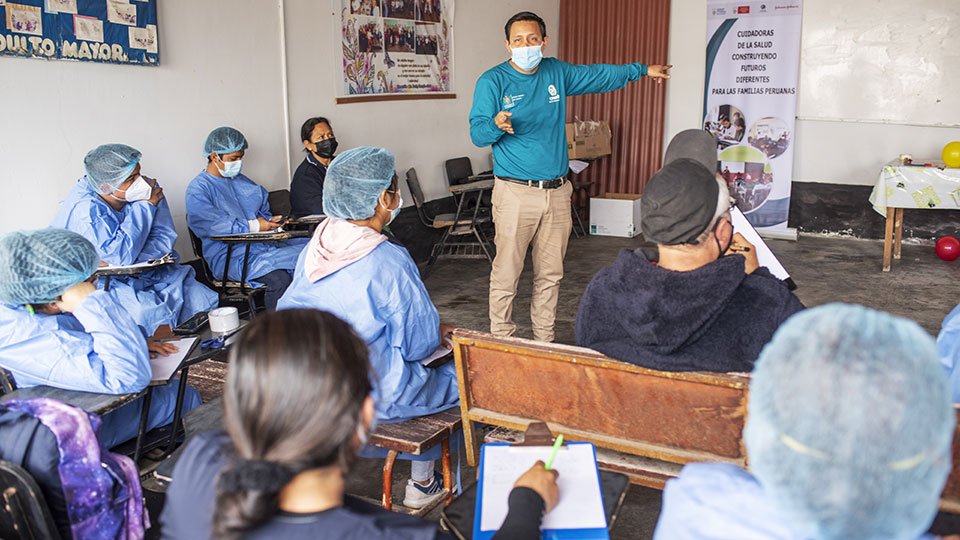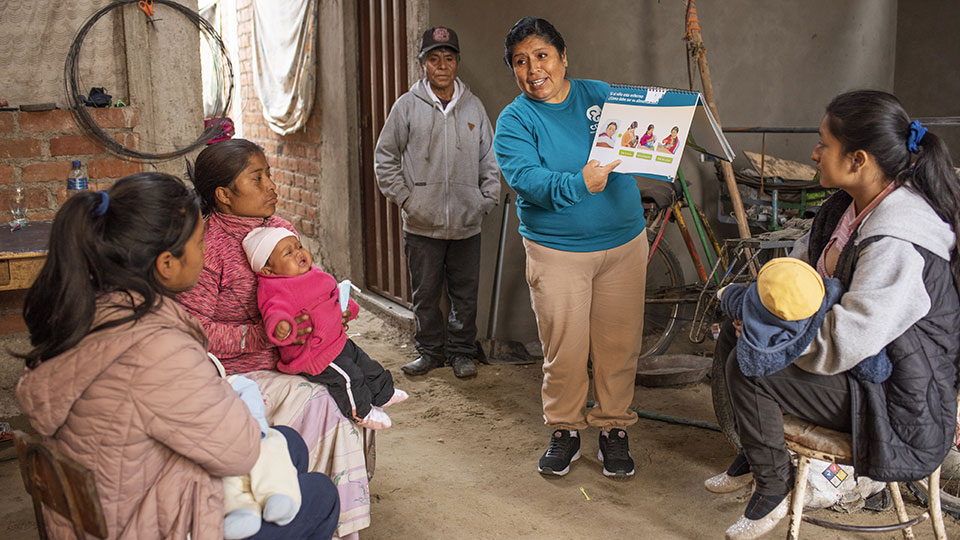Serving Our Health Workforce, So They Can Serve Others

Pedro Arce, a psychologist, leads an “Active Breaks” workshop with health facility staff. (Omar Lucas/Getty Images for CMMB)
Rural communities of Peru rely on the support of community health workers. Trained and equipped to make daily home visits throughout their neighborhoods, community health workers administer basic medical care, promote healthy practices, and support hospital referrals when needed. Often, community health workers are the only connection to health services for the people they reach. Communities know them as family, friends, and neighbors. They are not salaried in the same way traditional health workers are and sometimes work on a volunteer basis. But they are essential members of the health workforce, and their impact is no less lifesaving.
This was especially true during the pandemic, when Peru’s already fragile health system collapsed catastrophically, leaving it to become one of the pandemic’s hardest hit countries in the world. It was during the pandemic that Rosana’s journey as a CMMB-supported community health worker began. During World Health Worker Week, it’s an honor to share her story, which highlights the importance of investing in the mental health and wellbeing of our health workers—so that they can continue their lifesaving work for others.
Coping and Caring
“I have always had the need to learn more and help my community, which led me to become a community health worker,” said Rosana. “I did not think twice to accept the invitation.”
Despite Rosana’s commitment and eagerness to take on her new role, she struggled to cope with the pressure, anxiety, and emotional distress the pandemic demanded.
“Little by little it was breaking my mental and physical health, worsening my diabetes.”
Matters became even worse when Rosana’s own son began experiencing similar feelings. With growing concerns over his well-being, coupled with the stress of her work, Rosana needed support. CMMB connected Rosana to a mental health specialist, who helped her son get the support he needed. At the same time, Rosana began working with Lia, a psychologist.
Lia provided Rosana with strategies and tools to help her cope with the stress she was experiencing. Soon, Rosana began to feel better and empowered. With Lia’s support Rosana says that she was better able to care for her family—and her patients. As a community health worker, Rosana also participates in regular training sessions. Knowing that the wellbeing of community health workers is essential to quality of care they provide, CMMB implements activities meant to grow self-esteem, develop empathy, address family mourning, and help manage of difficult situations during these trainings. This includes navigating different hypothetical scenarios they might face in their work. Then together they brainstorm different ways of managing the various situations to achieve the most positive outcome.
Safe and Supported: Invest in Health Workers
CMMB Peru continues to prioritize mental health in their programming for both health workers and the patients they serve. In health facilities, a team of CMMB professionals develop training events to help staff manage stress. Exercises, including mindfulness through reflection and journaling, are shared during these trainings. Facility leaders now create safe spaces within the work environment to promote “active breaks” (a practice that helps health workers self-regulate their minds and bodies), designate time for monthly check ins with staff to build community, and provide individual psychological guidance. As a result, CMMB Peru has observed a positive change in organizational culture, marked by enhanced trust and communication between healthcare professionals and patients. The implementation of strategies such as empathy, active listening, and fostering an environment where patients feel encouraged to ask questions has resulted in significantly higher levels of patient satisfaction with the healthcare services provided.
At the community level, additional training in communication skills and stress management are helping community health workers like Rosana manage their mental well-being—as well as that of those they serve. Trained to look for signs of stress, anxiety, and community health workers can refer community members to mental health specialists when needed.

CMMB’s interventions in mental health and well-being have reached 160 community health workers and 255 health care professionals across 20 health facilities.
When health workers are equipped with the right support, including resources that prioritize mental health and well-being, they are better able to serve their families, communities, and patients—before, during, and after a crisis unfolds. Add your voice to the conversation during this health worker week and share that you support investments in mental health resources for health workers.